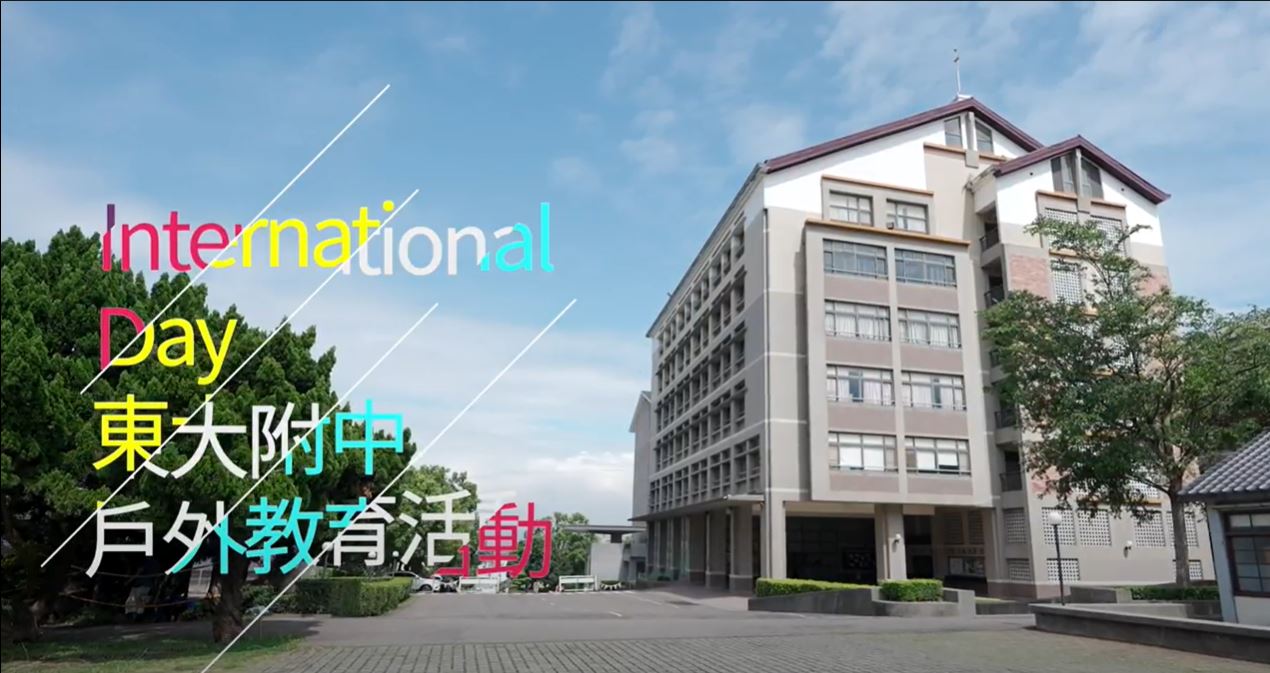東大附中國中部學生戶外教育活動報導:環境友善與永續發展體驗豐富多彩
Students' Outdoor Education Activity Report: Diverse Experiences in Environmental Friendliness and Sustainable Development
在2024年5月29日,東大附中(The Affiliated High School of Tunghai University)國際教育處聯合東海大學生命科學系,成功舉辦了一次別開生面的國中部戶外英語教育活動。此次活動以三項聯合國永續發展目標(SDGs)為核心,分別是淨水與衛生、責任生產與消費、保育陸域生態,將東大溪的整治、友善農業與食農教育、哺乳類保育、蜜蜂生態系、森林調查等內容,通過理論結合實作的方式,讓學生在體驗中學習環境永續的相關議題。相關教育活動設計涵蓋了豐富的課程模組,參與的師生們皆表示受益匪淺。紀錄短片已經上架,歡迎點擊以下連結觀看:https://youtu.be/auxmZlrB7BA。

此次活動由國際教育處統籌,特別感謝東海大學生命科學系卓逸民教授領導的課程規劃團隊,讓學生們在有趣的實踐中增進了對環境保護和永續發展的認識。
#### 環境友善食農教育
第一組活動地點在東大附中,針對國一學生展開。活動設計豐富多樣,學生們在育苗與扦插、香草介紹及DIY香草鹽蘇打餅乾、盆栽組合DIY、地瓜圓DIY、芝麻Q餅DIY以及夏日艾草驅蚊包DIY等模組中,學習了有機農業的運作方式及食材的生長過程,並動手製作了各種小食品與手工藝品。
* **育苗與扦插:** 學生們了解了有機農業的種植方式,並實際操作扦插技術,帶回家一盆自製香草。
* **香草介紹及蘇打餅乾DIY:** 學生們學習了香草的種類和用途,並親手製作了香草鹽蘇打餅乾。
* **盆栽組合DIY:** 學生們利用基本素材組合出具有觀賞價值的盆栽,增進了他們的美學素養。
* **地瓜圓DIY:** 學生們了解了大肚山特有的地瓜品種,並製作了美味的地瓜圓。
* **芝麻Q餅DIY:** 學生們學習了芝麻的歷史和用途,並製作了芝麻Q餅。
* **夏日艾草驅蚊包DIY:** 學生們了解了艾草的特性和功用,並製作了驅蚊香包。
#### 永續自然資源利用
第二組活動地點在東海小棧和東大溪解說教育館,針對國二學生展開。學生們通過野生動物保育研究、野生動物醫療救傷、溪流兩棲爬蟲和無脊椎動物認識及體驗、蜜蜂生物學與保育、蜜蜂產品永續利用、風水力發電及水質淨化實作等模組,深入學習了生態保育和資源永續利用的相關知識。
* **野生動物保育研究:** 學生們模擬使用麻醉槍進行野生動物保護,體驗生態學家的工作。
* **野生動物醫療救傷:** 學生們學習了動物麻醉和救傷技術,並實際操作相關器材。
* **溪流兩棲爬蟲和無脊椎動物認識及體驗:** 學生們近距離接觸兩棲類和爬蟲類動物,增進了他們的生態知識。
* **蜜蜂生物學與保育:** 學生們實際參觀了東海大學的養蜂場,了解蜜蜂的重要性。
* **蜜蜂產品永續利用:** 學生們利用蜂蠟製作蠟燭,並親手製作蜂蜜餅乾。
* **風水力發電及水質淨化實作:** 學生們學習了水力發電和水質淨化的原理,並進行了實際操作。
#### 森林生態與保育
第三組活動針對國三學生,地點在東海大學文理大道及生命科學系。學生們通過樹冠層調查技術、原住民傳統食物手工麻糬DIY、認識種子及種子吊飾製作、外來種脊椎動物移除模擬實作、馬來西亞熱帶森林介紹及特色點心DIY等模組,學習了森林生態和保育的相關知識。
* **樹冠層調查技術:** 學生們體驗了攀樹活動,學習了樹冠層生態系統的相關知識。
* **原住民傳統食物:** 學生們了解了台灣原住民的小米文化,並親手製作了小米麻糬。
* **認識種子及種子吊飾製作:** 學生們學習了大肚山地區植物的相關知識,並製作了種子吊飾。
* **外來種脊椎動物移除模擬實作:** 學生們體驗了外來種動物移除的工作,了解了其對生態的影響。
* **馬來西亞熱帶森林介紹及特色點心DIY:** 學生們學習了馬來西亞熱帶森林的知識,並製作了馬來西亞傳統甜湯。
國際教育處對參與此次活動的所有師生表示由衷的感謝,尤其是東海大學生命科學系卓逸民教授領導的課程規劃團隊,以及教務處、學務處、總務處、各班導師的熱情支援。全體國中部學生們對此次112學年度下學期舉辦的大型戶外教育活動內容感到十分有趣,不僅提升了專業的英文素養、生物學和自然科學知識,更在實踐中體驗了環境友善和永續發展的重要性。
【 Students' Outdoor Education Activity Report: Diverse Experiences in Environmental Friendliness and Sustainable Development 】
On May 29, 2024, the International Education Department of The Affiliated High School of Tunghai University, in collaboration with the Department of Life Sciences at Tunghai University, successfully organized a unique outdoor English education activity for junior high school students. This event focused on three United Nations Sustainable Development Goals (SDGs): Clean Water and Sanitation, Responsible Consumption and Production, and Life on Land. Through a combination of theory and practice, the activities covered topics such as the restoration of the Dongda River, sustainable agriculture and food education, mammal conservation, bee ecosystems, and forest surveys, allowing students to learn about environmental sustainability in an experiential manner. The educational activities included a variety of rich curriculum modules, and both teachers and students found them highly beneficial. A documentary video is now available; click the link to watch: https://youtu.be/auxmZlrB7BA.
The event was coordinated by the International Education Department. Special thanks go to Professor Zhuo Yimin of the Department of Life Sciences at Tunghai University and his course planning team for enhancing students' understanding of environmental protection and sustainable development through engaging hands-on experiences.
#### Environmentally Friendly Food and Agriculture Education
The first group of activities was held at The Affiliated High School of Tunghai University for first-year junior high students. The activities were diverse, allowing students to learn about organic farming and the growth processes of various ingredients through modules such as seedling cultivation and cuttings, herb introduction and DIY herb salt soda crackers, potted plant combinations, DIY sweet potato balls, DIY sesame rice cakes, and DIY summer mugwort mosquito repellent sachets.
* **Seedling Cultivation and Cuttings:** Students learned about organic farming methods and practiced cutting techniques, bringing home a self-made herb plant.
* **Herb Introduction and Soda Crackers DIY:** Students learned about different types and uses of herbs and made herb salt soda crackers by themselves.
* **Potted Plant Combinations DIY:** Students used basic materials to create aesthetically pleasing potted plants, enhancing their aesthetic appreciation.
* **Sweet Potato Balls DIY:** Students learned about the unique sweet potato varieties of Dadushan and made delicious sweet potato balls.
* **Sesame Rice Cakes DIY:** Students learned about the history and uses of sesame and made sesame rice cakes.
* **Summer Mugwort Mosquito Repellent Sachets DIY:** Students learned about the properties and uses of mugwort and made mosquito repellent sachets.
#### Sustainable Natural Resource Utilization
The second group of activities took place at the Donghai Xiaozhan and the Dongda River Interpretation Education Center for second-year junior high students. Through modules such as wildlife conservation research, wildlife medical rescue, recognition and experience of stream amphibians, reptiles and invertebrates, bee biology and conservation, sustainable use of bee products, hydropower generation, and water purification practices, students gained in-depth knowledge about ecological conservation and sustainable resource utilization.
* **Wildlife Conservation Research:** Students simulated using tranquilizer guns for wildlife protection, experiencing the work of ecologists.
* **Wildlife Medical Rescue:** Students learned animal anesthesia and rescue techniques and operated relevant equipment.
* **Recognition and Experience of Stream Amphibians, Reptiles, and Invertebrates:** Students had close encounters with amphibians and reptiles, enhancing their ecological knowledge.
* **Bee Biology and Conservation:** Students visited Tunghai University's apiary, learning about the importance of bees.
* **Sustainable Use of Bee Products:** Students used beeswax to make candles and made honey cookies.
* **Hydropower Generation and Water Purification Practices:** Students learned the principles of hydropower generation and water purification and engaged in hands-on activities.
#### Forest Ecology and Conservation
The third group of activities was for third-year junior high students, held at the Liberal Arts Avenue of Tunghai University and the Department of Life Sciences. Through modules such as canopy survey techniques, traditional indigenous food DIY millet cakes, seed identification and seed pendant making, simulation of the removal of invasive vertebrates, and an introduction to Malaysian tropical forests with DIY specialty snacks, students learned about forest ecology and conservation.
* **Canopy Survey Techniques:** Students experienced tree climbing activities and learned about the canopy ecosystem.
* **Traditional Indigenous Food:** Students learned about the millet culture of Taiwan's indigenous people and made millet cakes.
* **Seed Identification and Seed Pendant Making:** Students learned about the plants of the Dadushan area and made seed pendants.
* **Simulation of the Removal of Invasive Vertebrates:** Students experienced the work of removing invasive species and learned about their ecological impact.
* **Introduction to Malaysian Tropical Forests and Specialty Snacks DIY:** Students learned about the tropical forests of Malaysia and made traditional Malaysian sweet soup.
The International Education Department expresses heartfelt gratitude to all the teachers and students involved in this event, especially Professor Zhuo Yimin and his course planning team from the Department of Life Sciences at Tunghai University, as well as the Academic Affairs Office, Student Affairs Office, General Affairs Office, and class teachers for their enthusiastic support. The junior high school students found this large-scale outdoor education activity held in the second semester of the 112th academic year very engaging. It not only enhanced their English proficiency and knowledge of biology and natural sciences but also allowed them to experience the importance of environmental friendliness and sustainable development through practical activities.